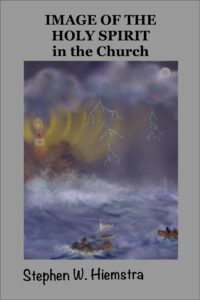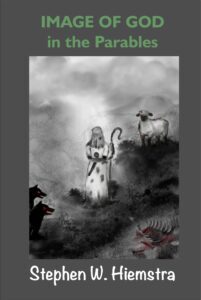Stephen W. Hiemstra's Blog, page 67
April 30, 2023
Pentecostal Prayer

By Stephen W. Hiemstra
Holy Spirit,
All praise and honor, power and dominion, truth and justice are yours, because you formed and empowered the church at Pentecost and in faith have come into our lives.
We confess that we have not lived into our salvation or shared it with those in need. Forgive us our selfishness, our pride, and our neglect of your church.
Thank you for Pentecost, for the many spiritual gifts, for your provision and sustenance, and for your presence and protection.
Draw us closer to you ever waking hour. Open our hearts, illumine our thoughts, and strengthen our hands in your service.
In Jesus’ precious name, Amen.
Pentecostal Prayer
Also see:
The Face of God in the Parables
The Who Question
Preface to a Life in Tension
Other ways to engage online:
Author site: http://www.StephenWHiemstra.net
Publisher site: http://www.T2Pneuma.com
Newsletter: https://bit.ly/Flowers_2023 , Signup
The post Pentecostal Prayer appeared first on T2Pneuma.net.
April 28, 2023
Battleground of the Church

For although they knew God, they did not honor him as God
or give thanks to him, but they became futile in their thinking,
and their foolish hearts were darkened.
(Rom 1:21)
By Stephen W. Hiemstra
The battleground of the church is the human heart.
The Biblical Heart
Just before God sent the flood to wipe out all of humanity, save Noah and his family, we read:
“The LORD saw that the wickedness of man was great in the earth, and that every intention of the thoughts of his heart was only evil continually. And the LORD regretted that he had made man on the earth, and it grieved him to his heart.” (Gen 6:5-6)
Notice the phrases, “every intention of the thoughts of his heart,” and “grieved him [God] to his heart.”
The word, heart, in the Hebrew is lev (לֵב BDB 4761), which means either “1. The inner man in contrast with outer” or “2. The inner man, indef., soul, comprehending mind, affections and will.” The Greek translation in the Septuagint is cardia (BDAG 3926 καρδία) that means either “1. Heart as seat of physical, spiritual and mental life” or “2. Interior, center, heart.” The Biblical heart is according closer to the term, soul, and clearly involves both mind and body, not simply a body part or emotional center.
The Apostle Paul Use of Heart
The Apostle Paul uses the concept of the heart in Genesis 6 in defining salvation: “If you confess with your mouth that Jesus is Lord and believe in your heart that God raised him from the dead, you will be saved.” (Rom 10:9) He also employs heart language in citing the antithesis of faith, as cited in Romans 1:21 above. This thesis and antithesis uses of heart in Paul’s writing displays the heart as the focal point of spiritual warfare.
Normally, we expect an argument to start with a statement of the thesis: the heart is the battlefield over which the question of faith is decided. Because Paul starts, not with the thesis as expected, but the antithesis—foolish hearts—we sense Paul taking the doctrine of original sin seriously. Our hearts are not a blank slate that our parents and teachers simply write on. Original sin darkens our hearts making the work of Christ on the cross necessary to implant the Holy Spirit at the moment of confession.
Original sin refers to the rebellion of Adam and Eve in disobeying God to eat of the tree of the knowledge of good and evil (Gen 2:17). This act defined Adam and Eve as lawbreakers and tainted the family tree. While Paul writes about “foolish hearts,” there is also a curse: “God gave them up in the lusts of their hearts.” (Rom 1:24) “Lusts of their hearts” rephrased as: “dishonorable passions.” (Rom 1:26) Original sin is a heart problem of loving the wrong things.
The Problem of Sin
The heart is accordingly not neutral ground. God’s general revelation, often pictured in Psalm 19, has been rejected. Paul writes: “For his invisible attributes, namely, his eternal power and divine nature, have been clearly perceived, ever since the creation of the world, in the things that have been made.” (Rom 1:20) Men and women did not honor God, were ungrateful, and were futile in their thinking (Rom 1:21). Furthermore, “They exchanged the glory of the immortal God for images resembling mortal man and birds and animals and creeping things.” (Rom 1:23)
The current fascination with the occult, gender, and the many emotional-support animals are not necessarily innocent obsessions, in part, because they represent confused hearts—hearts not loving the right things. Paul follows these “debased minds” down the slippery slope to their logical conclusion:
“They were filled with all manner of unrighteousness, evil, covetousness, malice. They are full of envy, murder, strife, deceit, maliciousness. They are gossips, slanderers, haters of God, insolent, haughty, boastful, inventors of evil, disobedient to parents, foolish, faithless, heartless, ruthless.” (Rom 1:29-31)
While your list of evil acts may not be the same as Paul’s, the point is that sin leaves no one untouched whose heart is allowed to gravitate to its own dishonorable passion.
Founding of the Church on Pentecost
The church began with the gift of the Holy Spirit on Pentecost. The Feast of Pentecost celebrated the barely harvest (or first fruits; Lev 23) that was a time of joy because it meant that the fasting and hunger from the previous winter—so common before the Industrial Revolution—would finally end. In this context, we read:
“When the day of Pentecost arrived, they were all together in one place. And suddenly there came from heaven a sound like a mighty rushing wind, and it filled the entire house where they were sitting. And divided tongues as of fire appeared to them and rested on each one of them. And they were all filled with the Holy Spirit and began to speak in other tongues as the Spirit gave them utterance.” (Acts 2:1-4)
Several observations here are important. First, the disciples were “all together in one place.” The church’s formation was a communal experience. Second, the Holy Spirit is the agent of this transformation “from heaven a sound like a mighty rushing wind” and the one filling each of them. Third, “tongues as of fire” enabled them all to speak in “other tongues.”
While the Holy Spirit inaugurates the church collectively, the Apostle Peter in speaking later the same day about what it means to participate in this transformation also refers to the agency of the Holy Spirit in individuals. He says: “Repent and be baptized every one of you in the name of Jesus Christ for the forgiveness of your sins, and you will receive the gift of the Holy Spirit.” (Acts 2:38) The church provides a forum for repentance and baptism, but it is the Holy Spirit that is the agent of transformation in the believer following God’s special revelation in Jesus Christ.
Battleground of the Church
Also see:
The Face of God in the Parables
The Who Question
Preface to a Life in Tension
Other ways to engage online:
Author site: http://www.StephenWHiemstra.net
Publisher site: http://www.T2Pneuma.com
Newsletter: https://bit.ly/Flowers_2023 , Signup
The post Battleground of the Church appeared first on T2Pneuma.net.
April 25, 2023
Hayes Structures Romance

Gwen Hayes. 2016. Romance the Beat: Story Structure for Romance Novels. www.RomancingTheBeat.com.
Review by Stephen W. Hiemstra
When I wrote my memoir, Called Along the Way: A Spiritual Memoir (2017), my editor encouraged me to write about members of my family. This idea ideally seemed odd to me—Isn’t this memoir about me? Why devote whole chapters to other people? As began reluctantly to write about family members, I realized that my interactions with them revealed even more about me. We are born, live, and die in relationship.
Introduction
In her book, Romancing the Beat: Story Structure for Romance Novels, Gwen Hayes writes about a key relationship—romance—and how to write about it. She writes: “The following story beats are intended to help you craft the romance arc that will hook your reader and keep them on the line all the way to a satisfying ending.” (2). Her target audience is:
Romance writers who have been told their books focus to much on the external plot.
Romance writers who know something is missing from their books, but are not sure where to look to find it.
Non-romance writers looking to strengthen the romantic elements of a different genre book. (6)
Hayes treats the word, beat, as synonymous with what others call a scene.
In my experience as a fiction author, I find that romance is a key element of just about any book in the postmodern era because men and women co-habitat virtually all aspects of life: family, school, workplace, even war. There is no place to hide in life so why would this not be true in postmodern fiction?
Background and Organization
Gwen Hayes (1970 – ) is a romance writer and editor.
Hayes structures her book around the beat sheet that she provides for romance books that share one theme: Love conquers all (7).
Her beat sheet includes these elements arranged into four acts that she refers to as phases:
Phase One: Setup
Intro H1
Intro H2
Meet Cute
No Way 1
Adhesion Plot Thrust
Phase Two: Falling in Love
No Way 2
Inkling this could work
Keeping Desire
Maybe this will work
Midpoint of Love Plot Thrust
Phase Three: Retreating from Love
Inkling of doubt
Deepening doubt
Retreat
Shields up
Break up
Phase Four: Fighting for Love
Dark night of the Soul
Wake-up/Catharis
Grand Gesture
What whole hearted looks like
Epilogue (v-vi)
The beat sheet is introduced with an extended introduction broken into a number of chapters and it is followed with a sample beat sheet, appendix, and about statement.
Assessment
Gwen Hayes writes her book, Romancing the Beat: Story Structure for Romance Novels, as a brief, how-to book for beginning romance authors. Her chapters are short and could be described as annotated beat elements that can be used much like the hero’s journey to begin a book outline. She writes in an accessible style and her points are clear. Her focus on conventional romance throughout the text left me unprepared for the unconventional romance described in her sample beat outline.
Footnotes
Hayes Structures Romance
Also see:
Books, Films, and Ministry
The Who Question
Preface to a Life in Tension
Other ways to engage online:
Author site: http://www.StephenWHiemstra.net
Publisher site: http://www.T2Pneuma.com
Newsletter: https://bit.ly/Spring_23 , Signup
The post Hayes Structures Romance appeared first on T2Pneuma.net.
April 24, 2023
Holy Spirit: Monday Monologues (podcast), April 24, 2023

By Stephen W. Hiemstra
This morning I will share a prayer and reflect on Holy Spirit. After listening, please click here to take a brief listener survey (10 questions).
To listen, click on this link.
Hear the words; Walk the steps; Experience the joy!
Holy Spirit: Monday Monologues (podcast), April 24, 2023
Also see:
The Face of God in the Parables
The Who Question
Preface to a Life in Tension
Other ways to engage online:
Author site: http://www.StephenWHiemstra.net
Publisher site: http://www.T2Pneuma.com
Newsletter: https://bit.ly/Flowers_2023 , Signup
The post Holy Spirit: Monday Monologues (podcast), April 24, 2023 appeared first on T2Pneuma.net.
April 23, 2023
Petition for the Holy Spirit

By Stephen W. Hiemstra
Spirit of God,
All praise and honor, power and dominion, truth and justice are yours because you sustain and provision all living things, live within us, and grant us all manner of spiritual gifts. Be ever near.
Forgive our lack of spiritual knowledge, unwillingness to practice forgiveness, and unbecoming haughty nature. Father of all holiness, create in us clean hearts.
Thank for teaching us the spiritual gifts of “Love, joy, peace, patience, kindness, goodness, faithfulness, gentleness, and self-control.” (Gal 5:22-23) May we ever share these gifts with everyone we meet.
Grant us discerning hearts and minds that we might love the things that you love and hate the things that you hate.
In Jesus’ precious name, Amen
Petition for the Holy Spirit
Also see:
The Face of God in the Parables
The Who Question
Preface to a Life in Tension
Other ways to engage online:
Author site: http://www.StephenWHiemstra.net
Publisher site: http://www.T2Pneuma.com
Newsletter: https://bit.ly/Flowers_2023 , Signup
The post Petition for the Holy Spirit appeared first on T2Pneuma.net.
April 21, 2023
The Holy Spirit in the New Testament

The earth was without form and void,
and darkness was over the face of the deep.
And the Spirit of God was hovering
over the face of the waters.
(Gen 1:2)
By Stephen W. Hiemstra
My recent book, Image and Illumination (2023), asked the question—What does it mean to be created in the image of God?— with a focus on Christian anthropology. In the course of discussion, it became apparent that the image of God in the New Testament takes at least three forms: The person of Jesus, Jesus’ teaching about the kingdom of God with the parables, and the founding of the church on Pentecost by the Holy Spirit. Here I will focus on the image of the Holy Spirit as found in the church.
The Postmodern Dilemma
We live at a time when the institutional church has lost its appeal for many people, especially young people, who in their heart-of-hearts doubt the teaching of the church and find worship both pointless and boring. Part of this dilemma stems from insufficient attention in the church to spiritual formation and part is due to the rise of materialism as the dominant cultural motif.
Where Nietzsche was the son of a Lutheran pastor and knew what it meant to be a Christian, today we confront sons and daughters of Nietzsche who overlook his insanity, eagerly grasp his will-to-power teaching, and have no clue as to what Christianity is about. So, while social media screams for our attention and standards of living, life expectancy and fertility rates in the United States are all falling, cultural Christianity has proven itself to be sterile and the church mutes the still, small voice of God, distracted with other issues.
In the midst of cultural meltdown and churchly amnesia, ecclesiology—study of the church—remains fervently untiled soil.
Old Testament Images
While the church as we know it is a product of the New Testament, antecedents of the church can be found in the image and work of the Holy Spirit in the Old Testament.
The avian image of God’s spirit found in Genesis 1:2 shows a contrast between the primordial chaos and God as creator. While the word used, spirit, is poetic, the core idea here is that the Holy Spirit embodies God’s agency in the world. God is not passive—he is an agent of change through his word. God’s word creates the universe and it is later embodied in covenants written down in scripture and proclaimed by God’s faithful messiahs: Priests, prophets, and kings. God’s agency is both manifested in his footloose spirit and embodied through scripture, temple, and charismatic leaders. The object of this agency is the identification and formation of God’s elect.
The Holy Spirit in Acts
The Holy Spirit is footloose in the Book of Acts as named and unnamed disciples carry the church to Jerusalem, Judea and Samaria, and the ends of the earth (Acts 1:8). At the council of Jerusalem, in spite of much opposition the Gospel is provisionally opened to gentiles (Acts 15:19-20). The Gospel reached the furthermost parts of the Roman Empire and beyond within a single generation. The purpose of the spirit in evangelism is to identify those called to be the church.
The Church in Paul’s Writing
The Apostle Paul’s work as an evangelist is mixed with the heart of a pastor in his letters to the churches. Listen to Paul’s letter to the church at Corinth:
“To those sanctified in Christ Jesus, called to be saints together with all those who in every place call upon the name of our Lord Jesus Christ, both their Lord and ours.” (1 Cor 1:2)
The phrase—called to be saints together—suggests both that our purpose in being called is to become more holy (ἁγίοις) and that this process can only be attained jointly with others called by God. Paul’s favorite description of the church, which is used here, is the called out ones or those called out (ἐκκλησίᾳ). Spiritual formation is accordingly a primary role of the church.
Formed in the Image
The agency of the Holy Spirit works in the church to identify and form Christians. Much like heaven and earth are formed together, hearts and minds must be formed together, if the faithful are to believe.
This unity of heart and mind poses a special challenge in today’s world where heart and mind are frequently treated as separate with one or the other being emphasized. Neglect of the heart leads to a stale, distant faith while neglect of the mind leads to a superficial faith with little application to daily challenges. The image of a Triune God—Father, Son, and Holy Spirit—reminds us that heart and mind are best taken together.
The Holy Spirit in the New Testament
Also see:
The Face of God in the Parables
The Who Question
Preface to a Life in Tension
Other ways to engage online:
Author site: http://www.StephenWHiemstra.net
Publisher site: http://www.T2Pneuma.com
Newsletter: https://bit.ly/Flowers_2023 , Signup
The post The Holy Spirit in the New Testament appeared first on T2Pneuma.net.
April 18, 2023
Parker Travels into the Heart of Darkness

Robert B. Parker. 1997. Night Passage: A Jesse Stone Novel. New York: Putnam.
Review by Stephen W. Hiemstra
Let’s face it. Men would rather watch their fiction than read it. I am no different, but it is hard to write fiction if you never read it. One way to reconcile this problem is to pick novels to read than you have already enjoyed watching.
This strategy led me to pick the first novel in the Jesse Stone series by Robert B. Parker: Night Passage. This series produced a sequence of films that starred Tom Selleck (1945-) who is best known for a television series, Magnum PI (1980-1988). His portrayal of Jesse Stone, the police chief of the imaginary town, Paradise, Massachusetts is both
credible and endearing. A number of novels from the Jesse Stone series have been produced as films.
Background and Organization
Robert B. Parker (1932 –2010) graduated from Colby College in Maine and earned both a master’s degree and doctorate at Boston University. He taught at Northeastern University, and has written nearly seventy books. Night Passage is written in seventy-seven chapters, which are basically short scenes.
Plot
The plot of Night Passage starts in Los Angeles where detective Jesse Stones is fired for being drunk on the job. His drinking problem appears to stem from a recent divorce from his actress wife, Jennifer, who got tired of playing number two fiddle to Jesse’s job and she has an affair with her producer. Jesse cannot give up his profession and is surprised when the Paradise city council hires him on as police chief, in spite of showing up drunk for his Chicago interview.
When he starts up an affair with the city counselor, he says out loud that he would not have hired himself, had he been on the other side of the table. Why did they hire him? We are never told but much of the novel revolves around finding an answer to this question. The answer is not pretty. The town council is headed by a banker, Hastings Hathaway, who launders money for a Boston gangster, heads the local militia group, and has a proclivity to murder people that get in his way. Paradise is a quiet little town that hopes the local police chief is good about issuing parking tickets and nothing more. Who cares if he has a drinking problem?
Ops. Jesse turns out to be a competent and fearless detective who still loves his ex-wife and is able to keep his mouth shut while he sorts out local crime. Much of the conflict in this novel revolves around the character clash between Jesse and Hastings.
Assessment
Robert B. Parker’s Night Passage is an intriguing crime thriller that is unlikely to disappoint. Even though I have seen all the movies made from this book series, I am likely to read other books in Jesse Stone series. I might not choose to associate with the characters presented, they are credible and interesting enough to care about.
Footnotes
https://en.wikipedia.org/wiki/Tom_Sel....
https://en.wikipedia.org/wiki/Robert_....
Parker Travels into the Heart of Darkness
Also see:
Books, Films, and Ministry
The Who Question
Preface to a Life in Tension
Other ways to engage online:
Author site: http://www.StephenWHiemstra.net
Publisher site: http://www.T2Pneuma.com
Newsletter: https://bit.ly/Flowers_2023 , Signup
The post Parker Travels into the Heart of Darkness appeared first on T2Pneuma.net.
April 17, 2023
Not: Monday Monologues (podcast), April 17, 2023

By Stephen W. Hiemstra
This morning I will share a prayer and reflect on Who God is Not. After listening, please click here to take a brief listener survey (10 questions).
To listen, click on this link.
Hear the words; Walk the steps; Experience the joy!
Not: Monday Monologues (podcast), April 17, 2023
Also see:
The Face of God in the Parables
The Who Question
Preface to a Life in Tension
Other ways to engage online:
Author site: http://www.StephenWHiemstra.net
Publisher site: http://www.T2Pneuma.com
Newsletter: https://bit.ly/Spring_23 , Signup
The post Not: Monday Monologues (podcast), April 17, 2023 appeared first on T2Pneuma.net.
April 16, 2023
Sabbath Petition

By Stephen W. Hiemstra
Lord of the Sabbath,
All praise and glory, power and dominion, truth and justice are yours, because you care for us in ways that we would never ask, yet cannot live without.
Forgive our sloth, our unwillingness to share, our greed and arrogance. Give us happy, open-handed attitudes to stem our weaknesses and pride.
Thank you for the parables of Jesus that teach us about yourself that we might grow more like you day-by-day.
In the power of your Holy Spirit, lead us through all stages of life with equal joy and faithfulness.
In Jesus’ precious name, Amen.
Sabbath PetitionThe post Sabbath Petition appeared first on T2Pneuma.net.
April 14, 2023
Who God is Not

Teacher, tell my brother to divide the inheritance with me.
But he said to him, Man, who made me
a judge or arbitrator over you?
(Luke 12:13-14)
By Stephen W. Hiemstra
The parables do not always tell us what we want to hear or explain things plainly. They draw us in and force us to confront our own motivations and relationships, particularly with God, through stories about our own lives. They also provide information about what God is not.
Things not descriptive of God arise directly from his characteristics. A merciful God is not capricious. A gracious God does not pic nits the way that Satan slanders, taunts, and tricks us. God is not impatient, unloving, or unfaithful. These observations are obvious, but it is helpful to review them because we are more familiar with ungodly traits in this life.
When people try to twist the image of God for their own purposes, we need to discern what is being done. Not everyone reads their Bible carefully and with good intentions. In the Garden of Eden, Satan twists God’s words in tempting Eve: “Did God actually say, You shall not eat of any tree in the garden?” (Gen 3:1) Again, when Satan tempts Jesus in the desert, he misquotes scripture three times and Jesus corrects him (Luke 4:3-13). We should not be surprised when this happens in our own lives.
Brothers in Conflict
In Luke 12, Jesus is put on the spot by two brothers arguing over their inheritance. We are not told the details of the dispute, but as anyone who has had to deal with inheritance issues can tell you, such disputes are often animated and painful. Who gets what and how much strikes deep into the quality of relationships with parents and siblings at a time when grief is still fresh. Such disputes can tear families apart and divide them for decades.
Jesus wisely refuses to be drawn into the brother’s dispute, not wanting to enable conflict. The Book of Genesis recounts a number of brotherly disputes, like the jealousy of Cain over his brother Abel’s better relationship with God (Gen 4:3-8). In the case of the Isaac and Ishmael (Gen 21:10), Jacob and Essau (Gen 25:29-34), and Joseph and his brothers (Gen 37:3), the family disputes revolved specifically around birthrights, inheritance, and leadership succession. The division of the Nation of Israel into the Northern and Southern Kingdoms, often pictured as feuding brothers, occurred after Solomon died and his son, Rehoboam, succeeded him and he was asked to lower taxes (1 Kgs 12). Taxes, like inheritance, is a money question.
Parable of the Rich Man
In response to the two brothers quarreling over their inheritance, Jesus tells a story:
“The land of a rich man produced plentifully, and he thought to himself, What shall I do, for I have nowhere to store my crops? And he said, I will do this: I will tear down my barns and build larger ones, and there I will store all my grain and my goods. And I will say to my soul, Soul, you have ample goods laid up for many years; relax, eat, drink, be merry. But God said to him, Fool! This night your soul is required of you, and the things you have prepared, whose will they be? So is the one who lays up treasure for himself and is not rich toward God.” (Luke 12:16-21)
This parable could easily describe the usual series of events leading up to retirement. The problem is that retirement is not a Christian concept—we just get more opportunity to choose how we spend our time. In my case, I hope to spend more time with my grandchildren than I had to spend with my kids.
The parable of the rich man divides into two parts. The first part echoes Ecclesiastes: “And I commend joy, for man has nothing better under the sun but to eat and drink and be joyful, for this will go with him in his toil through the days of his life that God has given him under the sun.” (Eccl 8:15) It is, however, one thing to practice Sabbath rest, it is another thing to eschew God and enjoy a life of ease (Heb 4).
Part two begins with the phrase: “But God said” (Luke 12:2). It draws on Proverbs, where we read: “Many are the plans in the mind of a man, but it is the purpose of the LORD that will stand.” (Prov 19:21) The Apostle Paul echoes this thought: “If anyone is not willing to work, let him not eat.” (2 These 3:10) In a world where children starve, sloth is an abomination and wealth carries responsibility.
God is not an Enabler
It is ironic that Jesus refuses to judge between the two brothers, because we believe that Christ will one day judge us all (Rev 21:27). By refusing to serve as a judge between the two brothers, Jesus refuses to enable their greedy behavior. If we think about this decision allegorically, God does not want to enable conflict, whether it is between brothers, sports teams, or countries.
When the people of Israel left Egypt, out of fear they refused to trust God and enter the Promised Land. God then cursed them to remain in the desert another forty years—long enough that all who were disobedient had died. God provides Sabbath rest, but does not enable disobedience (Heb 4). God is like good parents who educate and vacation with their kids, but does not bail them out when they misbehave and get into trouble. God is not an enabler.
Who God is Not
Also see:
The Face of God in the Parables
The Who Question
Preface to a Life in Tension
Other ways to engage online:
Author site: http://www.StephenWHiemstra.net
Publisher site: http://www.T2Pneuma.com
Newsletter: https://bit.ly/Spring_23 , Signup
The post Who God is Not appeared first on T2Pneuma.net.



